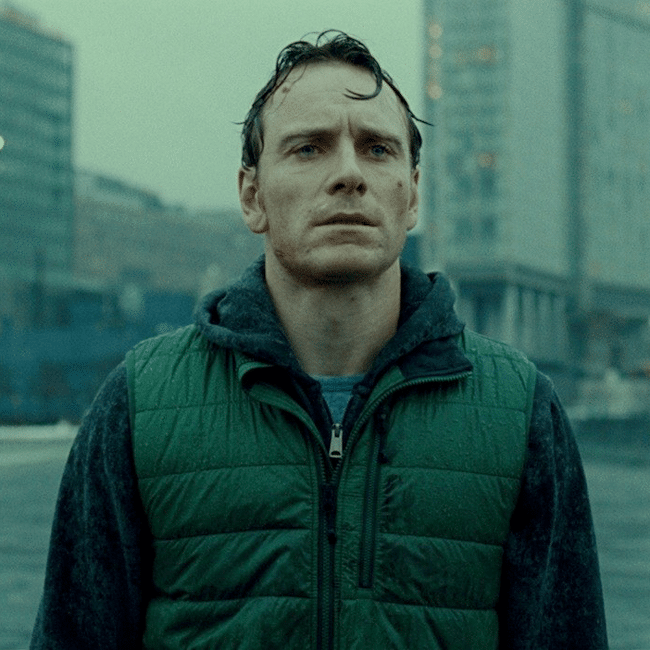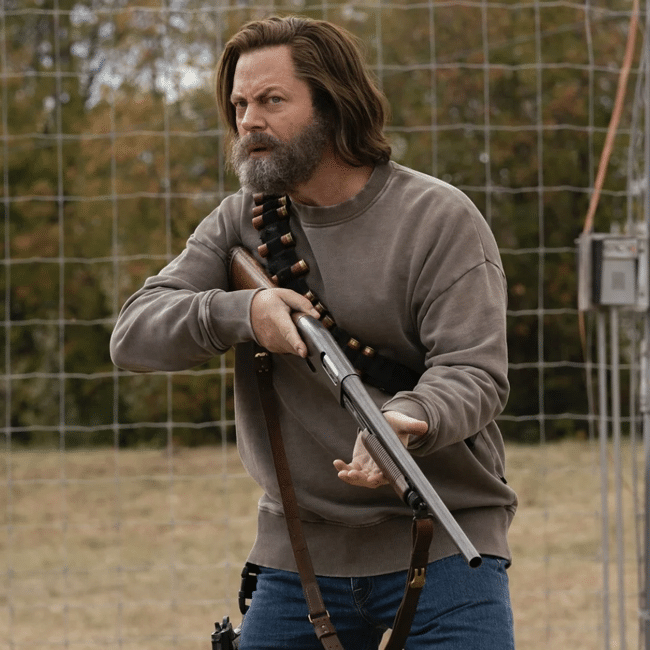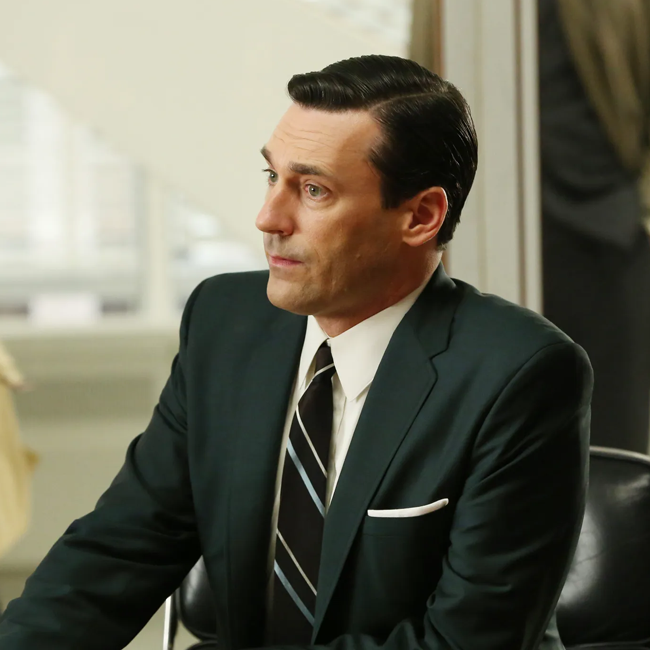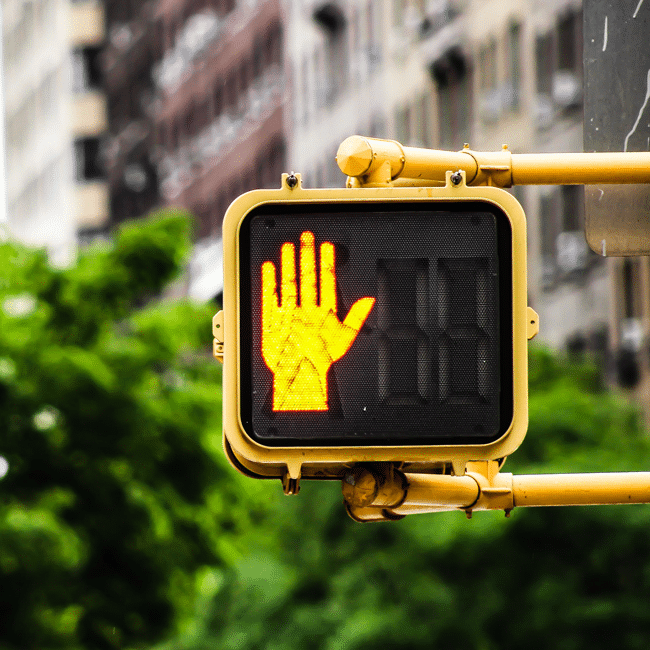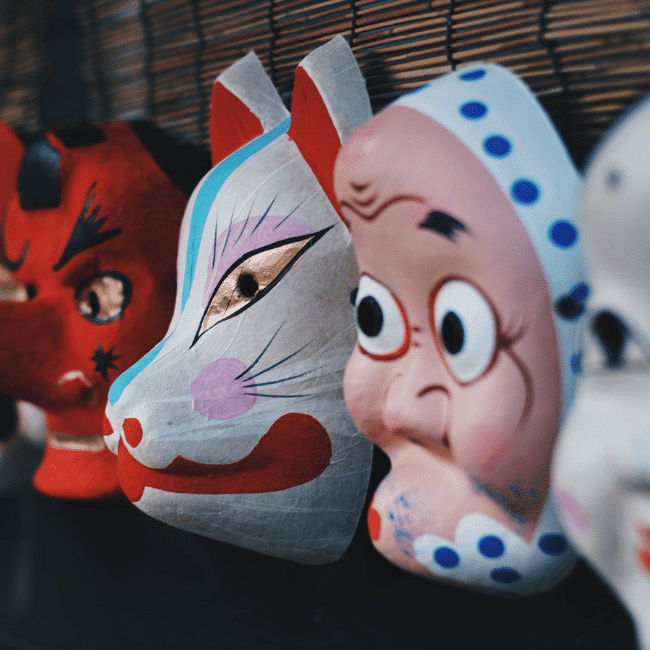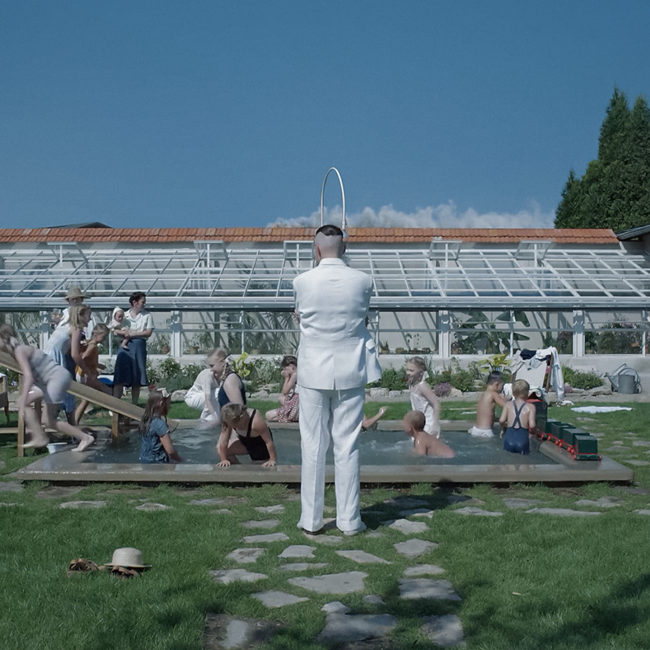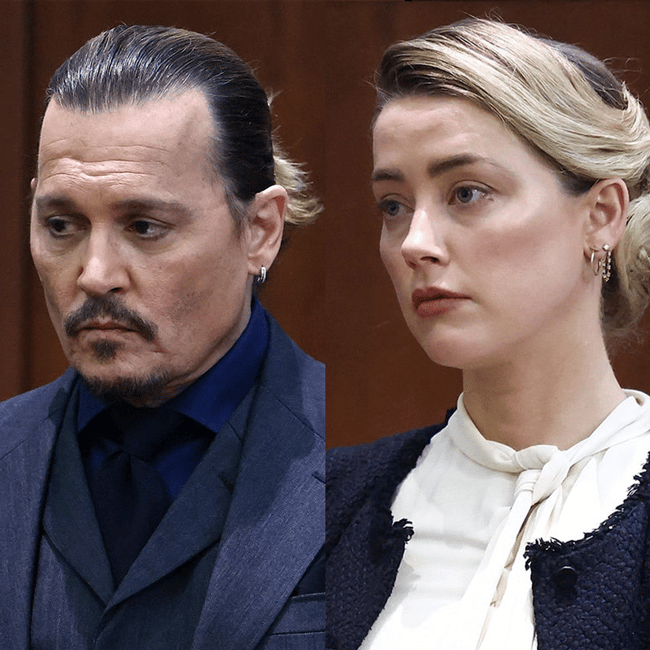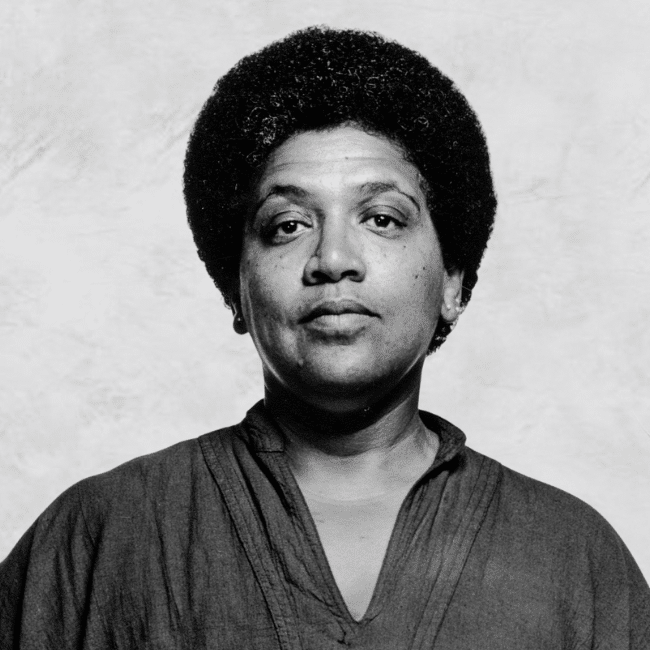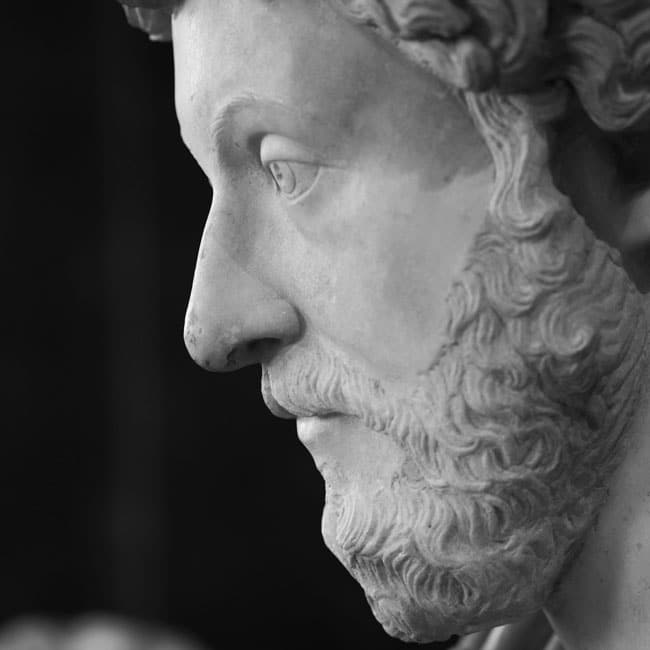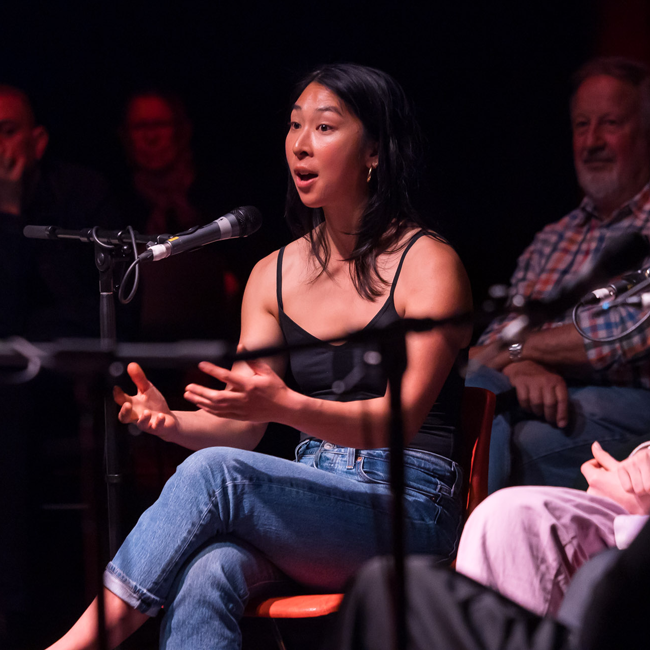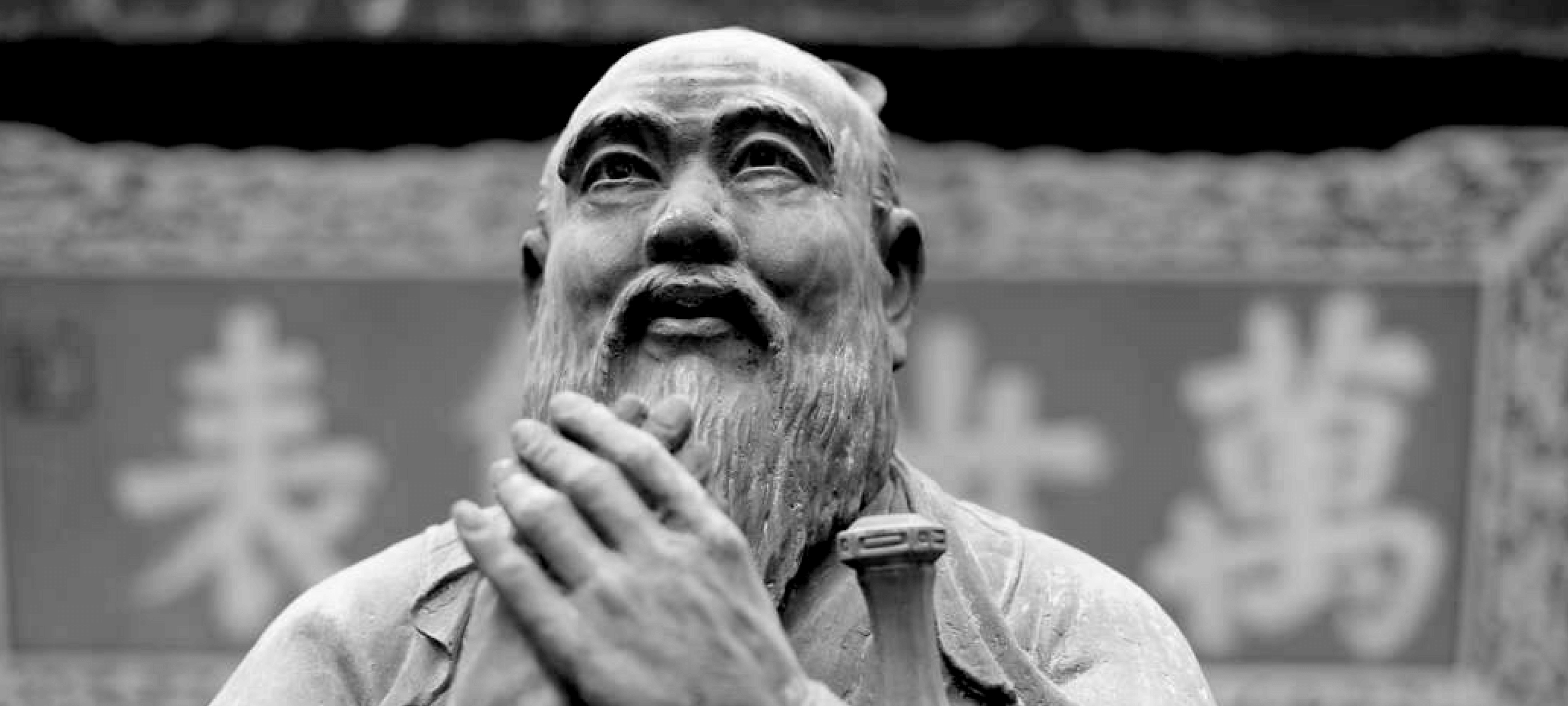Read me once, shame on you: 10 books, films and podcasts about shame

Read me once, shame on you: 10 books, films and podcasts about shame
Opinion + AnalysisSociety + Culture
BY The Ethics Centre 7 MAR 2024
Shame is something we have all experienced at some point. Of all the moral emotions, it can be the most destructive to a healthy sense of self. But do we ever deserve to feel it?
In order to unpack it’s complexities, we’ve compiled 10 books, films, series and podcasts which tackle the ethics of shame.
Jon Ronson – Shame Culture, Festival of Dangerous Ideas
Welsh journalist, Jon Ronson in his FODI 2015 talk examines the emergence of public shaming as an internet phenomenon, and how we can combat this culture. Based on his book, So You’ve Been Publicly Shamed, Ronson highlights several individuals behind high profile shaming, who after careless actions have been subject to a relentless lynch mob.
Disgrace – J. M. Coetzee
Fictional novel by South African author, J.M. Coetzee tells the story of a middle-aged Cape Town professor’s fall from grace following his forced resignation from a university after pursuing an inappropriate affair. The professor struggles to come to terms with his own behaviour, sense of self as well as his relationships around him.
The Whale
American film directed by Darren Aronofsky where a reclusive and unhealthy English teacher, hides out in his flat and eats his way to death. He is desperate to reconnect with his teenage daughter for a last chance at redemption.
The Kite Runner – Khaled Hosseini
Fictional novel by Afghan-American author, Khaled Hosseini which tells the story of Amir, a young boy from the Wazir Akbar Khan district of Kabul, and how shame can be a destructive force in an individual’s life.
World Without Rape, Festival of Dangerous Ideas
This panel discussion with Joanna Bourke, Jess Hill, Saxon Mullins, Bronwyn Penrith and Sisonke Msimang from FODI 2022 examines rape and its use in war, the home and society as an enduring part of history and modern life. The panel examines the role of shame from both a victim’s and perpetrator’s point of view and whether it is key to tackling the issue.
Muriel’s Wedding
The Australian beloved classic from P.J. Hogan portrays a young social outcast who embezzles money and attempts to fake a new life for herself.
The List – Yomi Adegoke
British fictional novel by Yomi Adegoke about a high-profile female journalist’s world that is upended when her fiancé’s name turns up in a viral social media post. The story is a timely exploration of the real-world impact of online life.
Shame
British psychological drama directed by Steve McQueen, exploring the uncompromising nature of sex addiction.
Reputation Rehab
Australian documentary series that believes we shouldn’t be consigned to a cultural scrapheap, and that most people are more than a punchline and deserve a second chance. Hosted by Zoe Norton Lodge and Kirsten Drysdale, guests include Nick Kyrigos, Abbie Chatfield and Osher Gunsberg.
It’s a Sin
British TV series depicting the lives of a group of gay men and their friends during the 1980-1990s HIV/AIDS crisis in the UK. The series unpacks the mechanics of shame and how it was built into queer lives, potentially affecting their own behaviour.
For a deeper dive, join us for The Ethics of Shame on Wednesday 27 March, 2024 at 6:30pm. Tickets available here.

Ethics in your inbox.
Get the latest inspiration, intelligence, events & more.
By signing up you agree to our privacy policy
You might be interested in…
Opinion + Analysis
Relationships, Society + Culture
Bring back the anti-hero: The strange case of depiction and endorsement
Opinion + Analysis
Society + Culture
The ethical honey trap of nostalgia
Opinion + Analysis
Society + Culture
Ask an ethicist: Is it OK to steal during a cost of living crisis?
Opinion + Analysis
Politics + Human Rights, Society + Culture
Why sometimes the right thing to do is nothing at all
BY The Ethics Centre
The Ethics Centre is a not-for-profit organisation developing innovative programs, services and experiences, designed to bring ethics to the centre of professional and personal life.
Losing the thread: How social media shapes us

Losing the thread: How social media shapes us
Opinion + AnalysisSociety + CultureRelationships
BY Daniel Finlay The Ethics Centre 4 MAR 2024
“I feel like I invited two friend groups to the same party.”
The slowly spiralling mess that is Twitter received another beating last year in the form of a rival platform announcement: Threads. And although this was a potentially exciting development for all the scorned tweeters out there, amid the hype, noise and hubbub of this new platform I noticed something interesting.
Some people weren’t sure how to act.
Twitter has long been associated with performative behaviour of many kinds (as well as genuine activism and journalism of many kinds). Influencers, comedians, politicians and every aspiring Joe Schmoe adopt personas that often amount to some combination of sarcastic, cynical, snarky and bluntly relatable.
Now, you would think that people migrating to a rival app with ostensibly the same function would just port these personas over. And you would be right, except for the hiccup of Threads being tied directly to Instagram accounts.
Why does this matter? As many users have pointed out, the kinds of things people say and do on Twitter and Instagram are markedly different, partially because of the different audiences and partially because of the different medium focus (visual versus textual). As a result, some people are struggling with the concept of having family and friends viewing their Twitter-selves, so to speak.
These posts can of course be taken with a grain of salt. Most people aren’t truly uncomfortable with recreating their Twitter identities on Threads. In fact, somewhat ironically, reinforcing their group identity as “(ex-)Twitter users” is the underlying function of these posts – signalling to other tweeters that “Hey, I’m one of you”.
The incongruity between Instagram and Twitter personas or expression has been pointed out by some others in varying depth and is something you might have noticed yourself if you spend much of your free time on either platform. In short, Instagram is mostly a polished, curated, image-first representation of ourselves, whereas Twitter is mostly a stream-of-consciousness conversation mill (which lends itself to more polarising debate). There are plenty of overlapping users, but the way they appear on each platform is often vastly different.
With this in mind, I’ve been thinking: How do our online identities reflect on us? How do these identities shape how we use other platforms? Do social media personas reflect a type of code-switching or self-monitoring, or are they just another way of pandering to the masses?
What does it say about us when we don’t share certain aspects of ourselves with certain people?
This apparent segmentation of our personality isn’t new or unique to social media. I’m sure you can recall a moment of hesitation or confusion when introducing family to friends, or childhood friends to hobby friends, or work friends to close friends. It’s a feeling that normally stems from having to confront the (sometimes subtle) ways that we change the way we speak and act and are around different groups of people.
Maybe you’re a bit more reserved around colleagues, or more comical around acquaintances, or riskier with old friends. Whatever it is, having these worlds collide can get you questioning which “you” is really you.
There isn’t usually an easy answer to that, either. Identity is a slippery thing that philosophers and psychologists and sociologists have been wrangling for a long time. One basic idea is that humans are complex, and we can’t be expected to be able to communicate or display all the elements of our psyche to every person in our lives in the same ways. While that’s a tempting narrative, it’s important to be aware of the difference between adapting and pandering.
Adapting is something we all do to various degrees.
In psychology, it’s called self-monitoring – modifying our behaviours in response to our environment or company. This can be as simple as not swearing in front of family or speaking more formally at work. Sometimes adapting can even feel like a necessity. People on the autism spectrum often “mask” their symptoms and behaviours by supressing them and/or mimicking neurotypical behaviours to fit in or avoid confrontation.
In lots of ways, social media has enhanced our ability to adapt. The way we appear online can be something highly crafted, but this is where we can sometimes run into the issue of pandering. In this context, by pandering I mean inauthentically expressing ourselves for some kind of personal gain. The key issue here is authenticity.
As Dr Tim Dean said in an earlier article in this series, “you can’t truly understand who someone is without also understanding all the groups to which they belong”. In many ways, social media platforms constitute (and indicate further) groups to which we belong, each with their own styles, tones, audiences, expectations and subcultures. But it is this very scaffolding that can cause people to pander to their in-groups, whether it simply be to fit in, or in search of power, fame or money.
I want to stress that even pandering in and of itself isn’t necessarily unethical. Sometimes pandering is something we need to do; sometimes it’s meaningless or harmless. However, sometimes it amounts to a violation of our own values. Do we really want to be the kinds of people who go against our principles for the sake of fitting in?
That’s what struck me when I read all of the confused messaging on the release of Threads. It’s one thing to not value authenticity very highly; it’s another to disvalue it completely by acting in ways that oppose our core values and principles. Sometimes social media can blur these lines. When we engage in things like mindless dogpiling or reposting uncited/unchecked information, we’re often acting in ways we wouldn’t act elsewhere without realising it, and that’s worth reflecting on.
It’s certainly something that I’ve noticed myself reflecting on since then. For some, our online personas can be an outlet for aspects of our personality that we don’t feel welcome expressing elsewhere. But for others, the ease with which social media allows us to craft the way we present poses a challenge to our sense of identity.

Ethics in your inbox.
Get the latest inspiration, intelligence, events & more.
By signing up you agree to our privacy policy
You might be interested in…
Opinion + Analysis
Relationships
Israel Folau: appeals to conscience cut both ways
Big thinker
Relationships
Big Thinker: Jelaluddin Rumi
Opinion + Analysis
Society + Culture
Critical thinking in the digital age
Big thinker
Politics + Human Rights, Relationships
Big Thinker: Noam Chomsky
BY Daniel Finlay
Daniel is a philosopher, writer and editor. He works at The Ethics Centre as Youth Engagement Coordinator, supporting and developing the futures of young Australians through exposure to ethics.
BY The Ethics Centre
The Ethics Centre is a not-for-profit organisation developing innovative programs, services and experiences, designed to bring ethics to the centre of professional and personal life.
AI might pose a risk to humanity, but it could also transform it

AI might pose a risk to humanity, but it could also transform it
Opinion + AnalysisScience + TechnologyBusiness + LeadershipSociety + Culture
BY Simon Longstaff 27 FEB 2024
It’s no secret that the world’s largest and most powerful tech companies, including Google, Amazon, Meta and OpenAI, have a single-minded focus on creating Artificial General Intelligence (AGI). Yet we currently know as little about what AGI might look like as we do about the risks that it might pose to humanity.
It is essential that debates around existential risk proceed with an urgency that tries to match or eclipse the speed of developments in the technology (and that is a tall order). However, we cannot afford to ignore other questions – such as the economic and political implications of AI and robotics for the world of work.
We have seen a glimmer of what is to come in the recent actors’ industrial action in Hollywood. While their ‘log of claims’ touched on a broad range of issues, a central concern related to the use of Generative AI. Part of that central concern focused on the need to receive equitable remuneration for the ongoing use of digital representations of real, analogue (flesh and blood) people. Yet, their deepest fear is that human actors will become entirely redundant – replaced by realistic avatars so well-crafted as to be indistinguishable from a living person.
Examples such as this easily polarise opinion about the general trajectory of change. At one end of the spectrum are the optimists who believe that technological innovation always leads to an overall increase in employment opportunities (just different ones). At the other end are the pessimists who think that, this time, the power of the technology is so great as to displace millions of people from paid employment.
I think that the consequences will be far more profound than the optimists believe. Driven by the inexorable logic of capitalism, I cannot conceive of any business choosing to forgo the efficiency gains that will be available to those who deploy machines instead of employing humans. When the cost of labour exceeds the cost of capital the lower cost option will always win in a competitive environment.
For the most part, past technical innovation has tended to displace the jobs of the working class – labourers, artisans, etc. This time around, the middle class will bear at least as much of the burden. Even if the optimists are correct, the ‘friction’ associated with change will be an abrasive social and political factor. And as any student of history knows, few political environments are more explosive than when the middle class is angry and resentful. And that is just part of the story. What happens to Australia’s tax base when our traditional reliance on taxing labour yields decreasing dividends? How will we fund the provision of essential government services? Will there be a move to taxing the means of production (automated systems), an increase in corporate taxes, a broadening of the consumption tax? Will any of this be possible when so many members of the community are feeling vulnerable? Will Australia introduce a Universal Basic Income – funded by a large chunk of the economic and financial dividends driven by automation?
None of this is far-fetched. Advanced technologies could lead to a resurgence of manufacturing in Australia – where our natural advantages in access to raw materials, cheap renewable energy and proximity to major population areas could see this nation become one of the most prosperous the world has ever known.
Can we imagine such a future in which the economy is driven by the most efficient deployment of capital and machines – rather than by productive humans? Can we imagine a society in which our meaning and worth is not related to having a job?
I do not mean to suggest that there will be a decline in the opportunity to spend time undertaking meaningful work. One can work without having ‘a job’; without being an employee. For as long as we value objects and experiences that bear the mark of a human maker, there will be opportunities to create such things (we already see the popularity of artisanal baking, brewing, distilling, etc.). There is likely to be a premium placed on those who care for others – bringing a uniquely human touch to the provision of such services. But it is also possible that much of this work will be unpaid or supported through barter of locally grown and made products (such as food, art, etc.).
Can we imagine such a society? Well, perhaps we do not need to. Societies of this kind have existed in the past. The Indigenous peoples of Australia did not have ‘jobs’, yet they lived rich and meaningful lives without being employed by anyone. The citizens of Ancient Athens experienced deep satisfaction in the quality of their civic engagement – freed to take on this work due to the labour of others bound by the pernicious bonds of slavery. Replace enslaved people with machines and might we then aspire to create a society just as extraordinary in its achievements?
We assume that our current estimation of what makes for ‘a good life’ cannot be surpassed. But what if we are stuck with a model that owes more to the demands of the industrial revolution than to any conception of what human flourishing might encompass?
Yes, we should worry about the existential threat that might be presented by AI. However, worrying about what might destroy us is only part of the story. The other part concerns what kind of new society we might need to build. This second part of the story is missing. It cannot be found anywhere in our political discourse. It cannot be found in the media. It cannot be found anywhere. The time has come to awaken our imaginations and for our leaders to draw us into a conversation about whom we might become.
Want to increase our ethical capacity to face the challenges of tomorrow? Pledge your support for an Australian Institute of Applied Ethics. Sign your name here.

Ethics in your inbox.
Get the latest inspiration, intelligence, events & more.
By signing up you agree to our privacy policy
You might be interested in…
Explainer
Health + Wellbeing, Society + Culture
Ethics Explainer: Logical Fallacies
Opinion + Analysis
Business + Leadership
The near and far enemies of organisational culture
Opinion + Analysis
Business + Leadership
How a Shadow Values Review can improve your organisation
Opinion + Analysis
Business + Leadership
Corporate tax avoidance: you pay, why won’t they?
BY Simon Longstaff
Simon Longstaff began his working life on Groote Eylandt in the Northern Territory of Australia. He is proud of his kinship ties to the Anindilyakwa people. After a period studying law in Sydney and teaching in Tasmania, he pursued postgraduate studies as a Member of Magdalene College, Cambridge. In 1991, Simon commenced his work as the first Executive Director of The Ethics Centre. In 2013, he was made an officer of the Order of Australia (AO) for “distinguished service to the community through the promotion of ethical standards in governance and business, to improving corporate responsibility, and to philosophy.” Simon is an Adjunct Professor of the Australian Graduate School of Management at UNSW, a Fellow of CPA Australia, the Royal Society of NSW and the Australian Risk Policy Institute.
'The Zone of Interest' and the lengths we'll go to ignore evil

‘The Zone of Interest’ and the lengths we’ll go to ignore evil
Opinion + AnalysisSociety + CulturePolitics + Human Rights
BY Joseph Earp 26 FEB 2024
The Zone of Interest is not really a Holocaust film. At least not in the traditional sense.
Unlike Schindler’s List, there are no scenes set in a concentration camp – no footage of gas chambers, or slaughter. And unlike The Pianist, the focus is not on suffering victims. Indeed, the victims are entirely offscreen, only present as a sort of ambient, sometimes audible, force. Our cast of characters here are a German family, living an ordinary life – or as ordinary as a life can be, when the patriarch, Rudolf Höss (Christian Friedel) is the commandant of Auschwitz, which lies just over the family’s garden wall.
The film features no literal violence whatsoever. Occasionally, we glimpse smoke from Auschwitz’s chimneys, cutting through the air; tiny touches, and the only clues that we are literally next door to the camp.
Instead, the genre that The Zone of Interest falls into – and cunningly undermines – is the domestic drama. Strip the Holocaust context out of the film, and you have a fairly humdrum story of a man trying to keep his family and his career together; working to raise his children, and rise up the ranks of his job. Insert that context back in, and the humdrum becomes terrifying.

The result is a film that tackles the question, “How did the Holocaust happen?”. It is interested in the mechanics of the slaughter – how it was enacted, and by whom. The answer lies in Höss. He has, it seems, emptied his work of all emotional context. It’s just a job to him. There are only very rare points where we see him express something like remorse – and even then, such outbursts feel uncontrolled; unconscious. In that way, The Zone of Interest has much to tell us not just about the Holocaust, but about moral responsibility, and the lengths people can go to avoid it.
Empathy and obligation
Höss has become so inured to his work – so horrifyingly, disturbingly used to it – that he acts like it has no moral quality at all. He seems to have no feelings, no empathy, and more than that, no knowledge that he even should have empathy.
This dispassionate quality is a common basis of those who avoid moral responsibility. When we do not emotionally feel the pain of others, through empathy, we will not have any motivation to avoid inflicting that pain. This is the heart of moral sentimentalism. If we are emotionally blind to suffering – even if we are aware that it is happening – we will not be compelled to act to stop it. Simply put, without emotions and empathy, our moral obligations lose their force.
Indeed, Höss’s lack of moral emotions makes him the successful endpoint of the Nazi propaganda machine. This machine worked hard to try and target the emotions of Nazi guards, and in the process neuter natural sympathetic responses. Most notably, Nazi propaganda dehumanised the Jewish population, painting Jews as fundamentally different from human beings. The comics writer Art Spiegelman attributes the following quote to Hitler, which sums up the position: “The Jews are undoubtedly a race, but they are not human.”
In this way, Nazi propaganda worked on “perceived similarity.” See, psychological studies suggest that empathy fires when we witness something that feels similar to our own experiences. We have to recognise the pain of others as meaningfully like our own in order to be sympathetic to it. This is why we don’t like seeing animals like dogs in pain – we anthropomorphise them, and see their suffering as “human”. It is also while most of us will not flinch at the torment of a bug. We think of dogs as like us, and bugs as not. The outward signs of a daddy longlegs in distress seem alien enough to us – different enough from our own – that our natural empathy is not triggered.
For Nazis like Höss, Jewish people were perceived as so alien – so dissimilar from other human beings – that the suffering of Jewish people came with no associated moral obligation. This is what we see in The Zone of Interest. Höss knows he is sending Jewish people to their deaths – how could he not? It is happening right next door – but he feels nothing about this murder. Höss is not maintaining a literal distance from the horror he is enacting, but he is maintaining an emotional distance, and this is what allows him to do what he does.

A reminder of what we share
This focus on emotional distance is what makes The Zone of Interest so timely – what expands its reach beyond the Holocaust.
We are all occasionally guilty of seeing those who suffer as being “different from us”; their pain as alien, or foreign. Those in warzones; refugees; victims of famine in the Third World – we can all see these people as being divorced from our regular life, emotionally different from us, and as a result, we can unconsciously discharge our obligation to them.
The antidote to this disaffection – to the emotional coolness that can stop us from helping when we need to – is reminding ourselves of what we share with others. It is about tapping into our essential humanity. The philosopher David Hume put this essential humanity simply – he believed as human beings, we all have an aversion to pain, and an attraction to pleasure. If we remember that, and keep in mind that all human beings want to live pain-free lives, then we will see the suffering of others as a great transgression, and will work harder to help when we can.
Indeed, this is the strange optimism buried at the heart of The Zone of Interest. The film suggests, very subtly, that we have a natural connection to those around us; that this shared wellspring of humanity can never be entirely vanquished.
Even Höss, who has worked so hard to completely distance himself from the suffering he is directly inflicting, is unable to escape his natural sense of empathy – in a key moment of the film, he has a kind of physical breakdown, suddenly overcome by all that he has tried not to see. There, in that scene, is buried a form of hope: even against all odds, sometimes, human connection survives. Because human feeling survives. And that is where our moral responsibility lives.

Ethics in your inbox.
Get the latest inspiration, intelligence, events & more.
By signing up you agree to our privacy policy
You might be interested in…
Big thinker
Politics + Human Rights, Relationships
Big Thinker: Eleanor Roosevelt
Opinion + Analysis
Society + Culture
The Ethics Centre Nominated for a UNAA Media Peace Award
Opinion + Analysis
Health + Wellbeing, Society + Culture
Alpha dogs and the toughness trap: How we can redefine modern masculinity
Opinion + Analysis
Business + Leadership, Politics + Human Rights
A foot in the door: The ethics of internships
BY Joseph Earp
Joseph Earp is a poet, journalist and philosophy student. He is currently undertaking his PhD at the University of Sydney, studying the work of David Hume.
Why sometimes the right thing to do is nothing at all

Why sometimes the right thing to do is nothing at all
Opinion + AnalysisPolitics + Human RightsSociety + Culture
BY Dr Tim Dean 8 FEB 2024
How a 1990s science-fiction show reminds us that just because we can do something, it doesn’t always mean we should.
Captain Jean-Luc Picard commands the USS Enterprise-D, a 600-metre-long starship that runs on antimatter, giving it virtually unlimited energy, and wielding weapons of devastating power.
In its journeys across the stars, depicted in Star Trek: The Next Generation, the crew of the Enterprise-D is often forced to draw on all its resources to overcome tremendous challenges. But that’s not what the show is really about.

If there’s one theme that pervades this iteration of Star Trek, it’s not how Picard and his crew use their prodigious power to get their way, it’s how their actions are more often defined by what they choose not to do. Countless times across the 176 episodes of the show, they’re faced with an opportunity to exert their power in a way that benefits them or their allies, but they choose to forgo that opportunity for principled reasons. Star Trek: The Next Generation is a rare and vivid depiction of the principle of ethical restraint.
Consider the episode, ‘Measure of a Man’, which sees Picard defy his superiors’ order to dismantle his unique – and uniquely powerful – android second officer, Data. Picard argues that Data deserves full personhood, despite his being a machine. This is even though dismantling Data could lead to the production of countless more androids, dramatically amplifying the power of the Federation.

One of the paradigmatic features of The Next Generation is its principle called the Prime Directive, which forbids the Federation from interfering with the cultural development of other planets. While the Prime Directive is often used as a plot device to introduce complications and moral quandaries – and is frequently bent or broken – its very existence speaks to the importance of ethical restraint. Instead of assuming the Federation’s wisdom and technology are fit for all, or using its influence to curry favour or extract resources from other worlds, it refuses to be the arbiter of what is right across the galaxy.
This is an even deeper form of ethical restraint that speaks to the liberalism of Gene Roddenberry, Star Trek’s creator. The Federation not only guides its hand according to its own principles, but it also refuses to impose its principles on other societies, sometimes holding back from doing what it thinks is right out of respect for difference.
The 1990s was another world
There’s a reason that restraint emerged as a theme of Star Trek: The Next Generation. It was the product of 1990s America, which turned out to be a unique moment in that country’s history. The United States was a nation at the zenith of its power in a world that was newly unipolar since the collapse of the Soviet Union.
It was an optimistic time, one that looked forward to an increasingly interconnected globalised world, where cultures could intermix in the “global village,” with its peace guarded by a benevolent superpower and its liberal vision. At least, that was the narrative cultivated within the US.
In a time where the US was unchallenged, moral imagination turned to what limits it ought to impose on itself. And Star Trek did what science fiction does best: it explored the moral themes of the day by putting them to the test in the fantasy of the future.
Today’s world is different. It’s now multipolar, with the rise of China and belligerence of Russia coinciding with the erosion of America’s power, political integrity and moral authority. The global outlook is more pessimistic, with the shadow of climate change and the persistence of inequality causing many to give up hope for a better future. Meanwhile, globalisation and liberalism have retreated in the face of parochialism and authoritarianism.
When we see the future as bleak and feel surrounded by threats, ethical restraint seems like a luxury we cannot afford. Instead, the moral question becomes about how far we can go in order to guard what is precious to us and to keep our heads above literally rising waters.
The power not to act
Yet ethical restraint remains an important virtue. It’s time for us to bring it back into our ethical vocabulary.
For a start, we can change the narrative that frames how we see the world. Sure, the world is not as it was in the 1990s, but it’s not as bleak as many of us might feel. We can be prone to focusing on the negatives and filling uncertainties with our greatest fears. But that can distort our sense of reality. Instead, we should focus on those domains where we actually have power, as do many people living in wealthy developed countries like Australia.
And we should use our power to help lift others out of despair, so they’re not in a position where ethical restraint is too expensive a luxury. Material and social wealth ultimately make ethics more affordable.
Just as importantly, restraint needs to become part of the vocabulary of those in positions of power, whether that be in business, community or politics.
Leaders need to implicitly understand the crucial distinction between ought and can: just because they can do something, it doesn’t mean they should.
This is not just a matter of greater regulation. For a start, laws are written by those in power, so they need to exercise restraint in their creation. Secondly, regulation often sets a minimum floor of acceptable behaviour rather than setting bar for what the community really deserves. It also requires ethical literacy and conviction to act responsibly within the bounds of what is legally permitted, not just a tick from a compliance team.
If you have power, whether you lead a starship, a business or a nation, then the greater the power you wield, the greater the responsibility to have to wield it ethically, and sometimes that means choosing not to wield it at all.

Ethics in your inbox.
Get the latest inspiration, intelligence, events & more.
By signing up you agree to our privacy policy
You might be interested in…
Opinion + Analysis
Politics + Human Rights
Israel or Palestine: Do you have to pick a side?
Opinion + Analysis
Politics + Human Rights, Relationships, Society + Culture
You won’t be able to tell whether Depp or Heard are lying by watching their faces
Big thinker
Society + Culture
Big Thinker: Philippa Foot
Opinion + Analysis
Business + Leadership, Politics + Human Rights
Survivors are talking, but what’s changing?
BY Dr Tim Dean
Dr Tim Dean is Philosopher in Residence at The Ethics Centre and author of How We Became Human: And Why We Need to Change.
Lisa Frank and the ethics of copyright

Lisa Frank and the ethics of copyright
Opinion + AnalysisSociety + Culture
BY Kieran Cashin 30 JAN 2024
Have you heard the song Lisa Frank 420 / Modern Computing by MACINTOSH PLUS? Even if you haven’t listened to it – you’ve probably heard it.
A buffering YouTube video, the visual glitches of a struggling graphics card, screen burn, unintelligible corrupted files – personified in vocals slowed to wordlessness, drums overlapping at conflicting time signatures and song structure only foundationally laid to be pulled out from underneath you – this is the spirit of Lisa Frank.
The YouTube upload of Lisa Frank has 23 million views. However, this upload is unofficial – there is no place you can purchase Lisa Frank, and uploading it anywhere on the internet is technically illegal. This is because Lisa Frank uses an unlicensed sample of It’s Your Move by Diana Ross. Any upload of the tracks is targeted with DMCA takedowns, or requests from the owners of the masters (record labels) that 100% of the revenue be diverted to them.
This isn’t ethical. Although copyright conceptually is generally uncontested in mainstream society, in this essay I will make the radical assertion that it foundationally enables the worst tendencies of capitalist societies and limits artistic expression.
There are two common angles in favour of copyright protection –
1. Copyright protects artistic intent and originality
This position argues that an artist has an inherent right to control their work. However, this is not the case and is only sensible when you individualise artworks to singular figures. Although useful in discussing commonalities between works, it is quickly outmoded in any other context.
When an artist releases a work, is it necessarily theirs? Do they have the right to control and change the work’s context and reaction?
The original version of Star Wars has been altered over years of reduxes and remasters and is no longer available to legally buy or stream – which is ostensibly an obscuration of the original film’s groundbreaking advancements that make it important to film history.
The changes to the film were essentially Lucas’s testing ground for his new special effects technology – although he insists on his changes simply because they are his, never mind the fact that the film is only special because of the audience’s appreciation of it, and it has no value independent of that appreciation.
Also, said appreciation it is not due to some quality inherent to the director, but rather due to the collaborative effort of hundreds of individuals: cinematographers, actors, set and costume designers, editors, VFX artists, folie / sound design artists and composers – don’t they all deserve some degree of control over these alterations?
Further, this mindset fails to take into account the transformative nature of art. Going back to our Lisa Frank example – the song is unrecognisable from the original sample, very clearly showing original thought, execution, and effort exerted in transforming the song into its own entity. Lisa Frank is far and away different from Diana Ross’s original recording, and yet according to copyright law, it is wholly the sum of its parts and thus at their behest.
There is no denying that plagiarism is a real phenomenon, but in copyright law it is conflated with what is merely derivative, leaving no room for nuance.
This flies in the face of the very nature of art – to eternally question and transform the structures around it (including other pieces). This suppression is very directly bad for art and artists.
Let’s examine the next common justification for copyright.
2. Copyright ensures that artists are correctly monetarily compensated.
This claim is partially true – monetarily compensated, yes. Correctly, no. The royalties/residuals system copyright operates on creates vast injustices in the compensation of artists.
Actors such as Emma Myles received residual checks as low as $20 for a role on Orange is the New Black – an immensely successful show that essentially made Netflix popular. Her work is managed by the conglomerate, and they control her earnings – and they can give her as little as they like.
Did you know that Diana Ross, the singer of the original recording of It’s Your Move, doesn’t actually own the masters to her recordings? She receives similar residuals, and granted, they’re probably much more than Emma Myles’. However, she is not actually in control of who uses her music – that right is reserved by Sony Music Entertainment. Diana Ross – at 79 years of age – likely doesn’t use the internet extensively enough to know anything about Lisa Frank or how her music has been used.
Obviously, these corporations don’t have a complete monopoly – another artist famous for not owning her masters, Taylor Swift, got hers back through a few legal battles and a lengthy re-recording process. However, she is uniquely privileged in this situation being a literal billionaire with essentially infinite legal power. Many other artists, even with a very clear cut case, don’t have the resources to fight back for control of their work.
This is because copyright, as a product of a capitalist system, is merely a symptom of the unjust society that produced it, inherently advantaging those with accumulated wealth.
In many ways its illegal status is an integral part of Lisa Frank. She is an internet vampire, signalling the decaying underbelly of our world, she beckons us away — it’s her move now…
‘Lisa Frank and the ethics of copyright‘ by Kieran Cashin is the winning essay in our Young Writers’ Competition (13-18 age category). Find out more about the competition here.

Ethics in your inbox.
Get the latest inspiration, intelligence, events & more.
By signing up you agree to our privacy policy
You might be interested in…
Opinion + Analysis
Society + Culture
How The Festival of Dangerous Ideas helps us have difficult conversations
Opinion + Analysis
Society + Culture, Politics + Human Rights
Pleasure without justice: Why we need to reimagine the good life
READ
Society + Culture
6 dangerous ideas from FODI 2024
Opinion + Analysis
Relationships, Society + Culture
Meet Daniel, helping us take ethics to the next generation
BY Kieran Cashin
Kieran is 15 years old and attends Newtown High School of the Performing Arts. Passionate about all forms of art and media, Kieran is interested in exploring complex questions about pop culture and the human condition through the mediums of film and writing.
On truth, controversy and the profession of journalism

On truth, controversy and the profession of journalism
Opinion + AnalysisPolitics + Human RightsSociety + Culture
BY Simon Longstaff 25 JAN 2024
The recent dispute between Antoinette Lattouf and the ABC has brought into focus the need to address some fundamental questions about the role of journalism, in general, and professional journalists, in particular.
In my opinion, journalism is (or at least should be) practiced as a profession. This is not to ignore the fact that journalists work within an intensely commercial environment. But so do those lawyers, accountants, engineers, doctors and others who are employed by the private sector. For members of these professions, the fact that they work for, say, ‘industry’ in no way reduces the scope or depth of their professional obligations.
What marks out a profession is first, that its members are obliged to subordinate self-interest in the service of a public good. For example, as Officers of the Court, lawyers are bound by a paramount duty to assist in the administration of justice. This obligation comes before any duty to the client, to the profession or to oneself. Second, each profession exists in relation to its own ‘defining good’. Doctors and nurses work to secure the public good of ‘health’. Members of the profession of arms are supposed to secure the defining good of ‘peace’. Engineers aim for safety, etc. Two professions are oriented towards the good of ‘truth’ – accounting and journalism.
In both cases, the value of ‘truth’ is not in any sense vague or abstract. The preparation of accounts that are ‘true and fair’ is essential to the operation of free markets in which participants make informed decisions. As Adam Smith understood so well, markets can never be ‘free’ if participants lie, cheat, or use power oppressively. Yet, Smith also knew that merchants were always liable to employ such tactics in pursuit of self-interest. Thus, the need for the profession of accounting – made up of people who freely choose to abandon the pursuit of self-interest in service of the public interest and a higher ‘good’.
The role that accountants play in markets is mirrored by the role that journalists play in politics – and especially in democracies. The legitimacy of liberal democracies rests entirely on the consent of the governed. The only consent that counts is that which is free, prior and informed. And consent can never be informed if it is based on lies. That is why those politicians who resort to falsehood in the pursuit of power do so much damage to our democracy.
Unfortunately, just as some merchants can be relied upon to resort to deception in the pursuit of profits, so can some politicians be relied upon to do the same in the pursuit of victory. Professional journalists are supposed to help protect society from that risk – which is why they are so often lauded as the ‘fourth estate’.
I realise that there are some people who claim the title of ‘journalist’ while playing their own part in publishing or broadcasting falsehood, or who lack the ‘disinterested gaze’ that should be demanded of members of this profession. Yet, the fact that some (or even many) fail to uphold professional standards does not mean that the standard is either wrong or pointless.
Now, one might hope that those in charge of the ABC would champion the ideal of professional journalism as outlined above. If so, then you might also hope that they understood what is entailed by commitment to such an ideal. Finally, one might hope that the ABC would have discerned that a core commitment to the truth is fundamentally incompatible with the avoidance of controversy. Put simply, the truth is often controversial – especially when it challenges conventional belief or confronts power (which can reside in ‘settled’ ideas and prejudice as much as in the hands of individuals and institutions).
The truth is often controversial – especially when it challenges conventional belief or confronts power.
That is where I think the ABC ran off the rails. The moment it elevated the ‘avoidance of controversy’ as an end in itself, it set a standard that it is simply impossible for any professional journalist to uphold.
The noted German philosopher, Immanuel Kant, argued that “ought implies can”. That is, one is not morally obliged to do that which is impossible. This clearly applies in cases of actual impossibility (e.g. flying to Mars on the back of a bandicoot). However, I think the maxim also extends to cases where something is ‘impossible’ to do without violating the dictates of a well-informed (and well-formed) conscience. It is in this sense that professional journalists are placed in an impossible position if required to seek and publish the truth without ever courting controversy.
Image by Pat M2007

Ethics in your inbox.
Get the latest inspiration, intelligence, events & more.
By signing up you agree to our privacy policy
You might be interested in…
Opinion + Analysis
Health + Wellbeing, Politics + Human Rights, Relationships
Ethics in a time of coronavirus
Opinion + Analysis
Society + Culture
Arguments around “queerbaiting” show we have to believe in the private self again
Opinion + Analysis
Relationships, Society + Culture
In Review: The Festival of Dangerous Ideas 2018
Big thinker
Relationships, Society + Culture
9 LGBTQIA+ big thinkers you should know about
BY Simon Longstaff
Simon Longstaff began his working life on Groote Eylandt in the Northern Territory of Australia. He is proud of his kinship ties to the Anindilyakwa people. After a period studying law in Sydney and teaching in Tasmania, he pursued postgraduate studies as a Member of Magdalene College, Cambridge. In 1991, Simon commenced his work as the first Executive Director of The Ethics Centre. In 2013, he was made an officer of the Order of Australia (AO) for “distinguished service to the community through the promotion of ethical standards in governance and business, to improving corporate responsibility, and to philosophy.” Simon is an Adjunct Professor of the Australian Graduate School of Management at UNSW, a Fellow of CPA Australia, the Royal Society of NSW and the Australian Risk Policy Institute.
Big Thinker: Audre Lorde
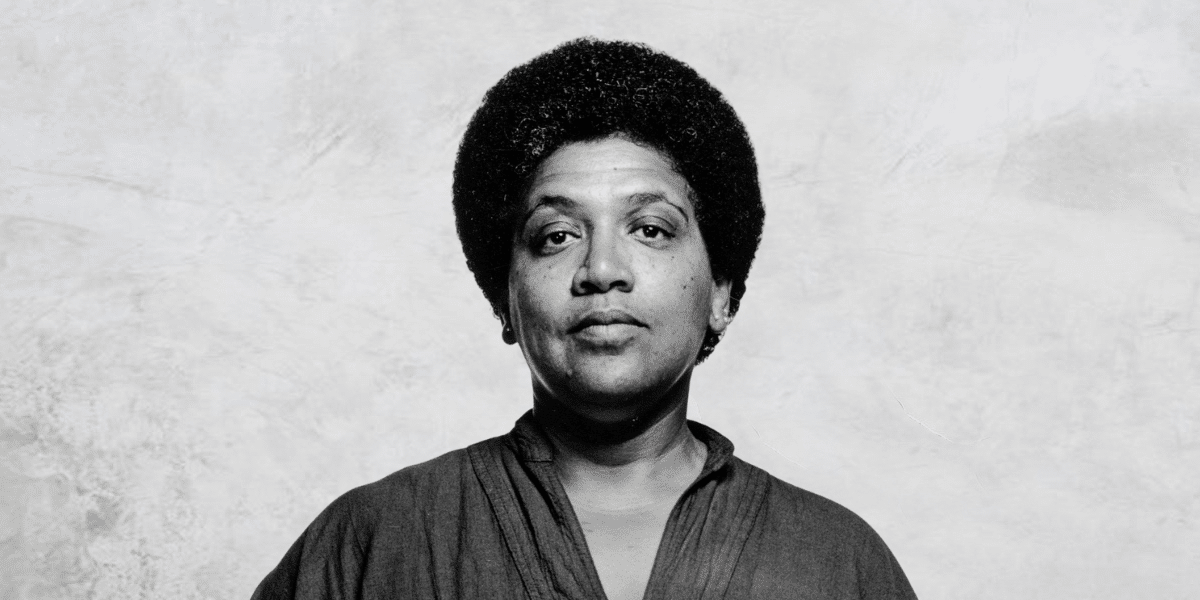
Big Thinker: Audre Lorde
Big thinkerPolitics + Human RightsSociety + Culture
BY The Ethics Centre 11 JAN 2024
Professionally a poet, professor and philosopher, Audre Lorde (1934-1992) also proudly carried the titles of intersectional feminist, civil rights activist, mother, socialist, “Black, lesbian [and] warrior.” She is also the woman behind the popular manifesto “the master’s tools will never dismantle the master’s house.”
Born Audrey Geraldine Lorde in New York City, to Frederic and Linda Belmar Lorde, on the 18th of February 1934, Lorde fell in love with poetry as a form of expression at a young age.
“I used to communicate through poetry,” she recalled in conversation with Claudia Tate for Black Women Writers at Work. “When I couldn’t find the poems to express the things I was feeling, that’s what started me writing poetry,” she said. Lorde was thirteen.
Alongside her education at Hunter High School in New York, and working on the school’s literary magazine, she published her first piece of literature in the 1951 April issue of Seventeen Magazine. She earned a Bachelor of Arts from Hunter College in 1959, preceding a master’s degree in library science in 1961 from Columbia University. Following that, Lorde worked as a librarian for public schools in New York City from 1961 to 1968, working her way to head librarian of Manhattan’s Town School. In 1980, Lorde and her friend, a fellow writer and activist, created a publishing house, ‘Kitchen Table: Women of Color Press.’ Throughout these years, Lorde was prolific and wrote some of her most recognised volumes of poetry. A full discography of her work can be found at the end of this article.
Authorship and legacy
Expression of self and personal philosophy through literature became a cornerstone of Audre Lorde’s life and one of her greatest contributions to the discourse on discrimination and equality today.
A proud feminist, Lorde’s authorship strived to offer an authentic depiction of the female experience; the good, the bad and the complex. She felt academic discourse on feminism was white and heterosexual centric, lacking consideration of the lived realities of Black and queer women. Thus, she put the stories of these women at the centre of her literature.
Lorde’s philosophy focussed particularly on intersectional discrimination and academic discourse’s inability to accommodate it. She revered differences amongst humans, arguing true equality can only be achieved through celebrating rather than homogenising our different identities.
Third Wave Feminism
Lorde was a prominent member of the women’s and LGBTQIA+ rights movements during the second wave of feminism. As a woman with many of her own labels, Lorde used her lived experience and literary expertise to shine a light on the experience and voices of other women with multiple signifiers. She implored society to confront racist feminism, the nuances of the Black female experience and the cognitive dissonance between educating yourself on feminism whilst not bearing witness to the experiences of all women, – particularly women of colour whose intellectual labour and contributions to such academia have been so routinely overlooked. Thus, helping kickstart the third wave of feminism, also spearheaded by another big thinker, Kimberle Crenshaw.
Through her words, Lorde aimed to acknowledge and capture the pain as well as the joy she felt as an openly queer Black woman. This bare-all intent and celebration of individuality is particularly felt in her work, The Cancer Journals and her subsequent public encouragement of other breast cancer survivors to wear their mastectomies on their chest, rather than accept prosthesis purely for aesthetic motivations. “It is that very difference that I wish to affirm… I lived it, I survived it, and wish to share that strength with other women.”
Philosophy on difference
Lorde was an advocate for difference amongst human beings. For her, difference was the key to eradicating discrimination and moving forward in unity. As we constantly reevaluate what it means to be human, what we hold dear and the ethical pillars we lean on to guide us, Lorde philosophised that it was vital we harness rather than fear that which separates us from our friends, peers and enemies. Rather than homogenising humanity, the future of equality relies on our ability to relate across differences. Finding community is not about conforming, it is about accepting. It must be an act of opening up, not of shutting down.
Lorde examined difference particularly through an intersectional feminist lens. Identifying and subverting the conditioning of women to view their differences as causes for separation and self-judgement.
What we need first, however, is courage. To have our beliefs and perspectives stretched and challenged as we begin the journey of embracing that which makes us different from those around us.
Intersectionality
Lorde was acutely aware of and vocal about the pressure on marginalised people to divide their identities in order to fight for recognition of their discrimination. Academia was constructed to examine, debate and interrogate ways of being. At the time, it was established by white men, and thus contributions to this school of thought were limited to the lived realities and perspectives of these men. As a result, the notion of a human norm came about, and this norm was white, male, heterosexual and often, but not always, wealthy, educated and upper class. Every deviation from this ideal was considered a handicap and treated as such.
In her speech at the New York University Institute for the Humanities, where she debuted her admonishment: “the master’s tools will never dismantle the master’s house,” Lorde cautioned people of colour and other marginalised demographics against the pressure to conform to the limited criteria of ‘acceptable’ laid out by discrimination discourse in white academia, in order to have their needs met. She argued fighting for equality within a system with the notion of a human ideal will only lead to disappointment. True and deeply entrenched equality can only happen through an entire paradigm shift; the unravelling of a human norm in the first place.

Ethics in your inbox.
Get the latest inspiration, intelligence, events & more.
By signing up you agree to our privacy policy
You might be interested in…
Explainer
Business + Leadership, Politics + Human Rights, Relationships
Ethics Explainer: Power
Opinion + Analysis
Health + Wellbeing, Politics + Human Rights
3 Questions, 2 jabs, 1 Millennial
Opinion + Analysis
Business + Leadership, Politics + Human Rights
Australia is no longer a human rights leader
Opinion + Analysis
Politics + Human Rights
Orphanage ‘voluntourism’ makes school students complicit in abuse
BY The Ethics Centre
The Ethics Centre is a not-for-profit organisation developing innovative programs, services and experiences, designed to bring ethics to the centre of professional and personal life.
Stoicism on Tiktok promises happiness – but the ancient philosophers who came up with it had something very different in mind
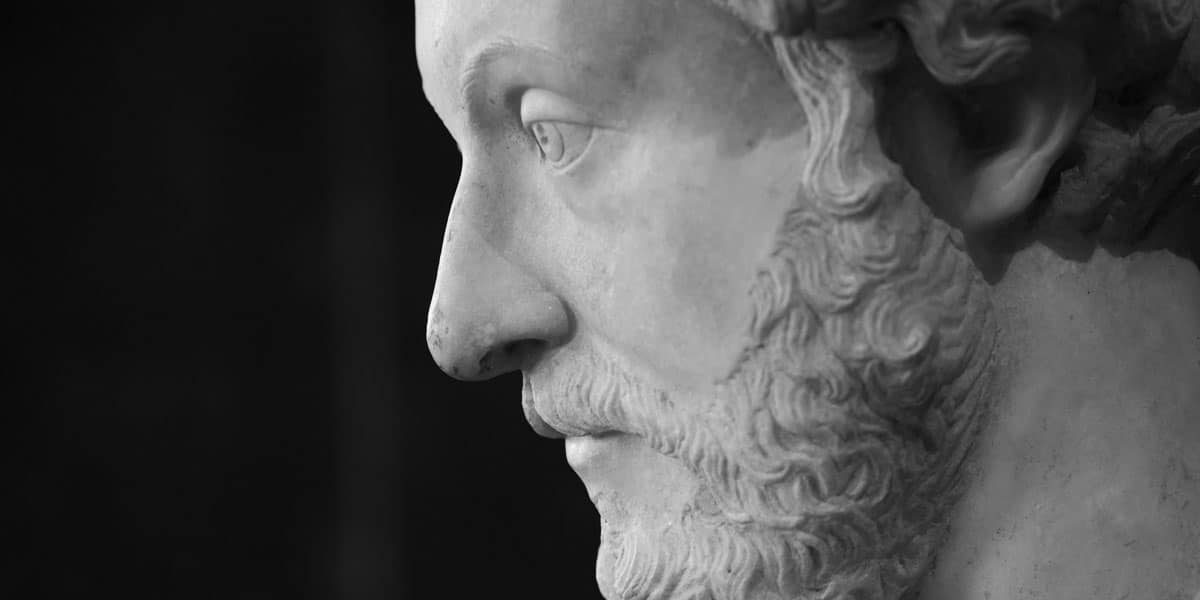
Stoicism on Tiktok promises happiness – but the ancient philosophers who came up with it had something very different in mind
Opinion + AnalysisSociety + CultureRelationships
BY Matthew Duncombe 20 DEC 2023
I don’t know about you, but my TikTok is full of influencers telling me I should be a Stoic. You might know the term “stoic” as a person who goes through hardship while maintaining a steely and calm disposition, and never complains. However, a stoic is also someone who prescribes to the philosophical school of Stoicism.
Stoicism became popular in ancient Rome. Stoic TikTok exclusively draws on Roman Stoicism, mainly Epictetus (a formerly enslaved person), Seneca (a fabulously wealthy and self-aggrandizing advisor to the emperor Nero), and Marcus Aurelius (who was himself a Roman emperor).
But the school goes back much further to ancient Athens, where Stoicism was founded around 300BCE by Zeno of Citium. After Zeno, Stoicism flourished in Athens, especially under Chrysippus, known as the second founder of Stoicism.
On TikTok, you’ll see people saying that Stoicism is a great way to lead a happy and productive life. I’m a professional philosopher who specialises in ancient Greek philosophy – and it’s great, if somewhat surprising, to see how popular Stoicism has become over the last ten years. But as a philosopher, I’m not a Stoic – and Stoic TikTok gets quite a lot wrong about this way of thinking.
Despite what you see on TikTok, Stoicism was a dry, technical, ivory tower philosophy. Its ideas around happiness and productivity diverge quite a bit from what modern people consider these to be. Traditionally, it was divided into three branches: ethics, physics, and logic – much of which TikTok’s Stoic preachers don’t get quite right.
Logic
Distinctively, the Stoics emphasised logic, comparing it to the shell of an egg or the bones and sinews of a body, because logic protects (like a shell), supports (like bones) and connects (like sinews) our beliefs and knowledge. In fact, the Stoics developed a systematic logical theory which, through various historical twists and turns, inspired 20th-century logic and hence theoretical computer science.
The Stoics took logic seriously because it was needed for knowledge. For the Stoics, to know something – including how to live well – was to understand it so totally that you could defend your view against any degree of argumentative scrutiny, against any opponent. In other words, they used logic to win a sort of philosophical Hunger Games.
But Stoic TikTok isn’t really interested in a deep, rich and logically defensible knowledge of the world and our place in it. In so far as Stoic TikTok is interested in knowledge, it implies that you can get knowledge by simply reading quotations of famous Stoics or practising certain mental exercises, such as meditating on death.
Physics
Stoic TikTok also ignores Stoic physics – the principles that Stoics used to explain the natural processes in the universe. For the Stoics, everything that exists, including your soul and God, is a body. God, in fact, is “mixed with matter, pervading all of it and so shaping it, structuring it and making it into the world”, as the critic Alexander of Aphrodisias told us in the early third century.
The Stoics argued that, since God is rational and active, this makes everything that exists in the world rational and organised for the best. You are part of this rational universe so, if bad things happen to you, it would be irrational to complain – as if your foot complained about getting muddy.
This idea of a rational universe is popular with Stoic TikTok, and can be seen in posts telling followers to “love their fate”. They suggest that true happiness comes from accepting anything that happens.
But does loving your fate in a truly Stoic sense achieve the sort of productivity and happiness most people want? I think not.
Ethics
Which brings us to Stoic ethics. While Stoic TikTok promises productivity and happiness, it’s unlikely you’ll achieve the levels of productivity and happiness you actually desire if you go by what Stoics believed these to be.
Happiness, for a Stoic, was a matter of having virtues and lacking vices. Everything else – including health, wealth and status – were “indifferents”, because they made no difference to your virtue, and so to your happiness.
So, even if the self-helpy advice of Stoic TikTok could make you more productive, being more productive won’t make you be happier, according to Stoic philosophy. At best, you’ll acquire health, wealth or status, but those things are indifferent to your happiness.
There is, of course, something hypocritical about Seneca arguing that wealth is indifferent while being one of the richest men in Rome; or Marcus Aurelius saying that power is indifferent while being emperor.
It is rational to prefer to be healthy rather than ill, rich rather than poor, powerful rather than oppressed. In fact, there was nuanced ancient debate in which the Stoics tried to find a middle way between a view where health, money and power are simply good, and a view where they are totally irrelevant to living a good life.
Chrysippus tried to steer this course by saying that while health, wealth and power are indifferent, how you use them is not. If I use power intemperately or wealth to indulge my most disgusting appetites, I will not be virtuous or happy. Personally, I don’t think the Stoic philosophy will ultimately solve this problem of whether health, wealth and power are totally indifferent to happiness, but it is an open question.
I’ve not touched here on the more sinister aspects of Stoicism on the internet, discussed in Donna Zuckerberg’s Not All Dead White Men. Rather, I’ve tried to point out what Stoic TikTok misses, because I hope people dive deeper into Stoic philosophy. A great place to start is Tad Brennan’s The Stoic Life.
Stoicism is a rich, fascinating and sophisticated philosophical tradition. But, if you’re looking for happiness and productivity in more modern terms, the Stoics might not have the answer.
This article was originally published by The Conversation. Image by Bradley Weber.

Ethics in your inbox.
Get the latest inspiration, intelligence, events & more.
By signing up you agree to our privacy policy
You might be interested in…
Opinion + Analysis
Relationships
The ANZAC day lie
Opinion + Analysis
Society + Culture, Relationships
There is more than one kind of safe space
Big thinker
Politics + Human Rights, Relationships
Big Thinker: Confucius
Opinion + Analysis
Business + Leadership, Society + Culture
Four causes of ethical failure, and how to correct them
BY Matthew Duncombe
I am an Associate Professor, University of Nottingham, working mainly on Plato, Aristotle, the Stoics and ancient sceptics. I often write about ancient logical and metaphysical ideas, but I have a broad range of philosophical interests, including ethics, games, fate, paradoxes and mental health, especially ancient perspectives on these.
What does love look like? The genocidal “romance” of Killers of the Flower Moon
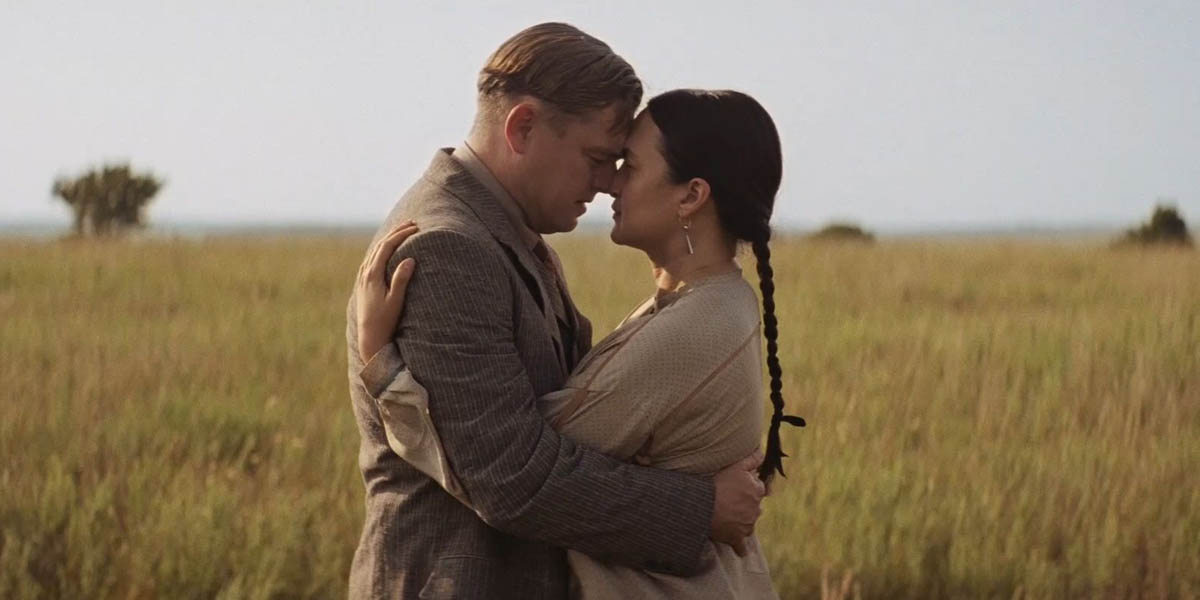
What does love look like? The genocidal “romance” of Killers of the Flower Moon
Opinion + AnalysisRelationshipsSociety + Culture
BY Joseph Earp 19 DEC 2023
Killers of the Flower Moon, the newest film by Martin Scorsese, starts with a terrible, distorted version of the romantic “meet-cute.”
Ernest Burkhart (played with leery relish by Leonardo DiCaprio) romances Molly Kyle (Lily Gladstone). He’s a driver; she needs to get around the place. Throwing knowing looks over his shoulder as he spins his wheel, he flirts with her, and though she is initially suspicious, eventually she succumbs to his interests. A romance is born.
It is the classic “boy meets girl” story – or at least, it would be, if we didn’t already know the real reason driving Ernest’s romantic designs. He has been put up to this meeting by “King” Hale (Robert DeNiro), his calculating and murderous Uncle, who is seeking to redirect the fortunes of the Osage tribe of which Molly is a member. Though he projects an image as a pillar of the community, King is the centre of a string of murders – and Ernest is recruited as his budding killer-to-be, with Molly as a target.
The tension at the heart of Killers of the Flower Moon lies in Ernest’s dual role as Molly’s wife and her poisoner. Though Ernest is the film’s main character, we are given little in the way of his interior life. Instead, we understand the man through his actions, which are, increasingly, in direct conflict. Ernest acts like he loves Molly, and the children they have together; he weeps when one dies. He also injects her daily with a poison. When, in the film’s climax, the pair are reunited, he almost collapses into her arms. Nobody outright asks Ernest if he loves Molly, but they ask similar questions, and he responds in the full-throated affirmative. She is his wife, and at least some of the time, he treats her as such.
So, do we want to accept this kind of attachment – murderous, openly destructive – as a form of love? Or would doing so fundamentally taint the concept?
Love as a blinding force
The ethical value of love has long been debated by philosophers. Plato and Socrates both saw love as a fundamentally morally valuable emotion – one which expands our sense of the world’s beauty and possibility, and motivates us to do better. Indeed, according to this view of love, romance is the foundation of ethical action.
It’s a way of teaching us of the importance of other people, an escape from selfish solipsism that draws out into the world.
But love – as the mere existence of the term “crime of passion” proves – does not always lead us down virtuous paths. Any romance also has the capability of reducing ethical scope, not expanding it. Arthur Schopenhauer, the notorious pessimist, saw love as an essential “illusion” that consumes people utterly. He described it as little more than the desire to procreate, over which the fiction of romance gets written. On this view, love creates a lopsided sense of ethical value, transforming the world down to a single point – the love object. This in turn breeds jealousy; possession; and, Schopenhauer said, frequently madness.
What makes Ernest’s “love” distinct, however, is that he doesn’t seem to experience the usual ethical pitfalls of romance. He’s not jealous of Molly. He doesn’t act as though he wants to possess her – at least not in the normal sense. Nor does he, in the traditional sense, go mad. Instead he acts to destroy her, an essentially self-negating series of actions where the one he prizes the most is also the one he seeks to snuff out.

Love in and of itself
Perhaps ironically, given his reputation as a cold, difficult and abstract philosopher, it is Immanuel Kant who provides the solution to the puzzle of Ernest’s love. Taken as a whole, Kant is paradoxical on the nature of love – he once dismissed it as a “feeling”, and wrote that “a duty to love is an absurdity.”
But, importantly, Kant did believe we should love one another. And more than that, this was a duty to love another “in and of itself.” One of Kant’s key ethical positions is the idea that using another – treating them like a mere “means” – is wrong. Instead, he believed that we should view other people as an “ends”. Kant believed that value did not exist outside human beings – that we create value – and that we should view all others, including those we love, as the source of value in the world. We respect and love others, he thought, because we see them not for what they can do for us, but for what they are; what they value and what they care about.
Ernest does not do this. Both of the ways that he treats Molly – doting on her and poisoning her – are for his own benefit. He has turned her into a mere object, a machine for love and money. She gives him children, and her death will give him riches and success. When he falls into her arms and embraces her, he is embracing not the whole Molly – the full, rich person, a source of value in the world – but only the parts of her that help him.
In this way, Ernest’s broken form of love serves as a warning to the rest of us.
When we say we love someone, we should direct that emotion to all who they are. Not choosing the parts we like, or the parts that service us. But the difficult parts; the awkward parts; the fears and the pains as well as the highs.
A lover’s eyes should always be open, after all.

Ethics in your inbox.
Get the latest inspiration, intelligence, events & more.
By signing up you agree to our privacy policy
You might be interested in…
Opinion + Analysis
Health + Wellbeing, Relationships
Living well or comfortably waiting to die?
Opinion + Analysis
Politics + Human Rights, Relationships
Adoption without parental consent: kidnapping or putting children first?
Opinion + Analysis
Health + Wellbeing, Relationships
Send in the clowns: The ethics of comedy
Opinion + Analysis
Health + Wellbeing, Relationships
